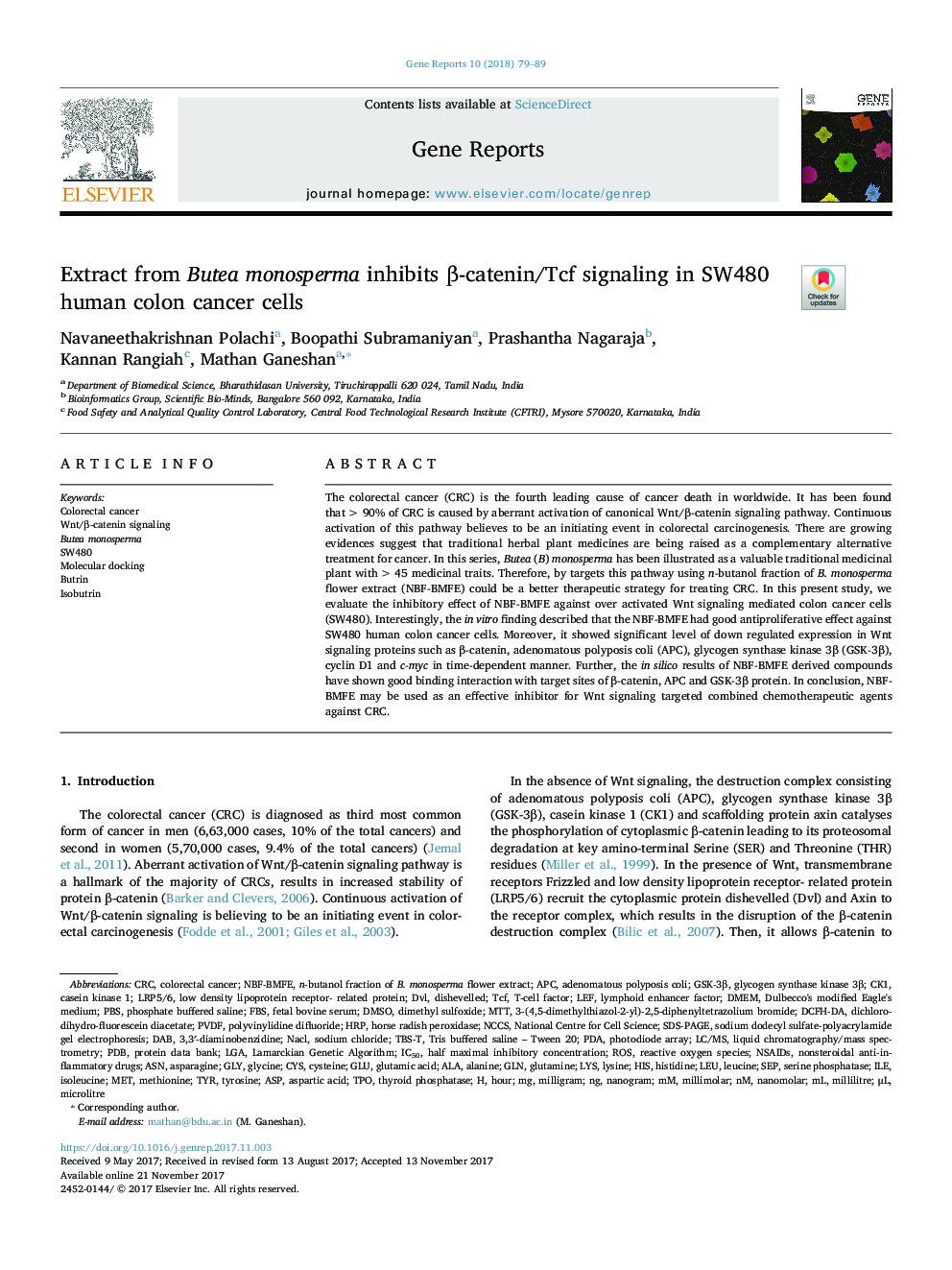| Article ID | Journal | Published Year | Pages | File Type |
|---|---|---|---|---|
| 8646257 | Gene Reports | 2018 | 11 Pages |
Abstract
The colorectal cancer (CRC) is the fourth leading cause of cancer death in worldwide. It has been found that > 90% of CRC is caused by aberrant activation of canonical Wnt/β-catenin signaling pathway. Continuous activation of this pathway believes to be an initiating event in colorectal carcinogenesis. There are growing evidences suggest that traditional herbal plant medicines are being raised as a complementary alternative treatment for cancer. In this series, Butea (B) monosperma has been illustrated as a valuable traditional medicinal plant with > 45 medicinal traits. Therefore, by targets this pathway using n-butanol fraction of B. monosperma flower extract (NBF-BMFE) could be a better therapeutic strategy for treating CRC. In this present study, we evaluate the inhibitory effect of NBF-BMFE against over activated Wnt signaling mediated colon cancer cells (SW480). Interestingly, the in vitro finding described that the NBF-BMFE had good antiproliferative effect against SW480 human colon cancer cells. Moreover, it showed significant level of down regulated expression in Wnt signaling proteins such as β-catenin, adenomatous polyposis coli (APC), glycogen synthase kinase 3β (GSK-3β), cyclin D1 and c-myc in time-dependent manner. Further, the in silico results of NBF-BMFE derived compounds have shown good binding interaction with target sites of β-catenin, APC and GSK-3β protein. In conclusion, NBF-BMFE may be used as an effective inhibitor for Wnt signaling targeted combined chemotherapeutic agents against CRC.
Keywords
GSK-3βASPPDBDVLHRPALACysDCFH-DATCFLEUμLAPCNSAIDSTBS-TCK1GLNLGAASNSEPTPONCCsSW480Lamarckian genetic algorithmPBSDMEMFBSDABPVDFPDANaClIC503-(4,5-dimethylthiazol-2-yl)-2,5-diphenyltetrazolium bromide3,3′-diaminobenzidineDMSOLC/MSLRP5/6Dulbecco's modified Eagle's mediumMTTROSadenomatous polyposis coliphotodiode arrayAsparagineAspartic acidalanineglutamic acidsodium dodecyl sulfate-polyacrylamide gel electrophoresisSDS-PAGEisoleucineIleButea monospermadishevelledTyrTyrosineHISNonsteroidal anti-inflammatory drugspolyvinylidine difluorideDichloro-dihydro-fluorescein diacetateDimethyl sulfoxideHourSodium chlorideColorectal cancerfetal bovine serumCysteineWnt/β-catenin signalingT-cell factorlymphoid enhancer factorPhosphate buffered salineLefLeucineLysineLYSMethionineMETmillimolarMillilitremilligrammicrolitrenanomolarnanogramhalf maximal inhibitory concentrationhistidinehorse radish peroxidaseProtein Data BankMolecular dockingcasein kinase 1CRCLiquid chromatography/mass spectrometryGluglutamineGlyGlycineGlycogen synthase kinase 3βReactive oxygen species
Related Topics
Life Sciences
Biochemistry, Genetics and Molecular Biology
Genetics
Authors
Navaneethakrishnan Polachi, Boopathi Subramaniyan, Prashantha Nagaraja, Kannan Rangiah, Mathan Ganeshan,
